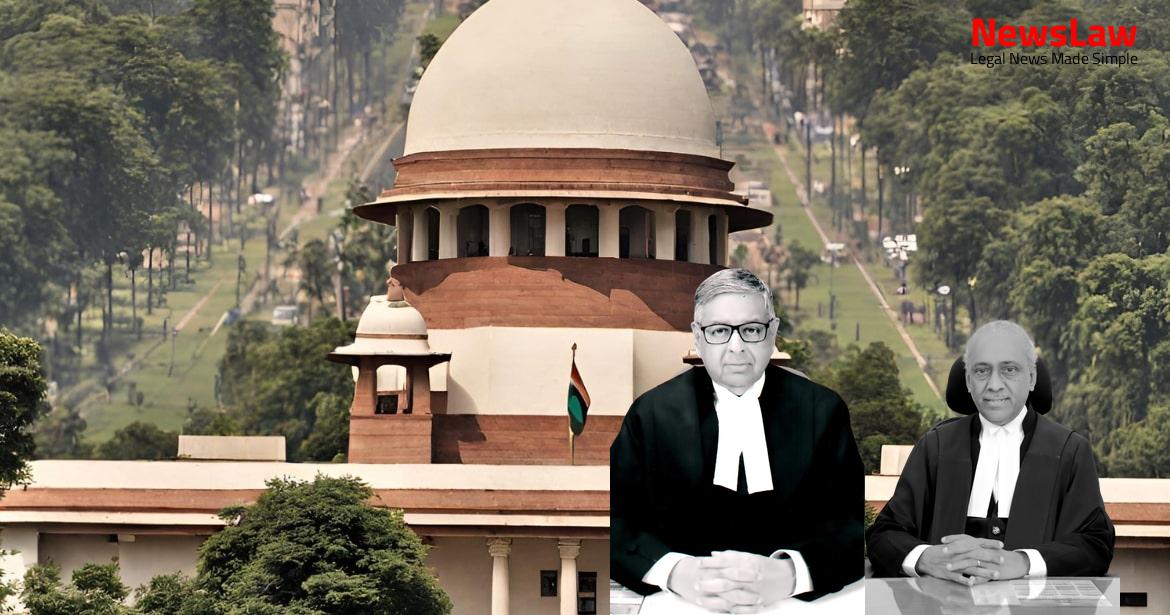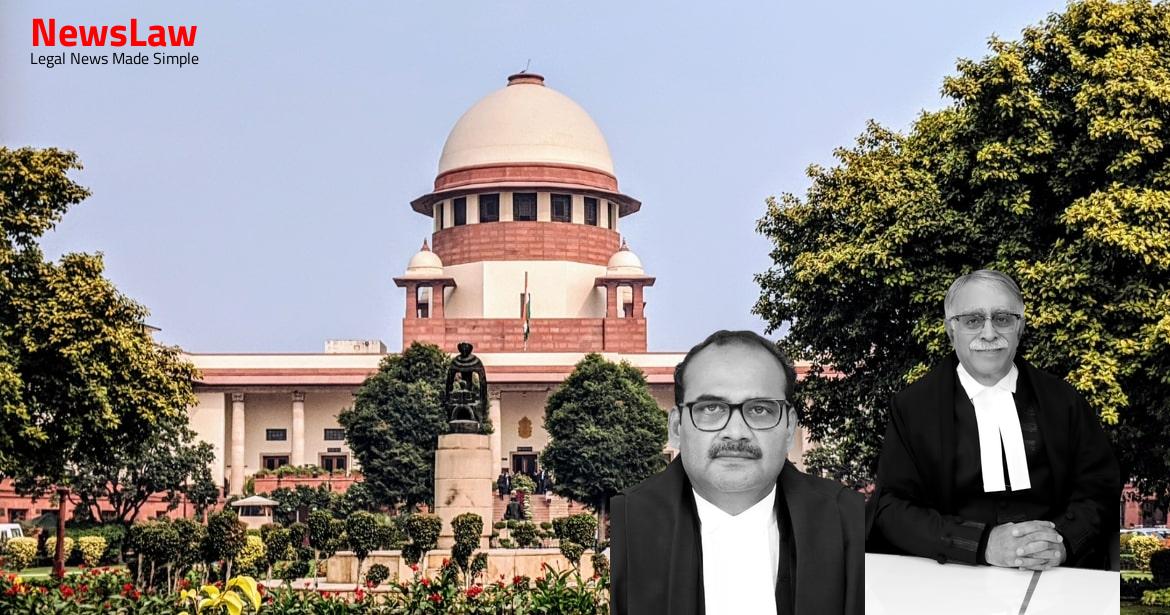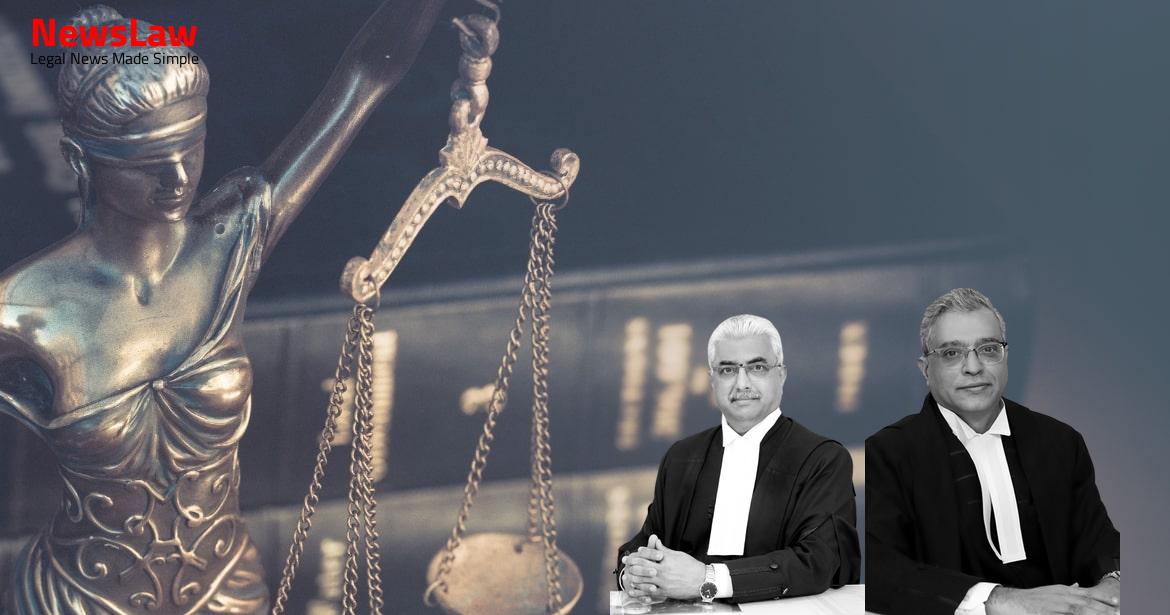In a significant legal development, the Supreme Court of India has delivered a crucial judgement on the determination of the ‘seat’ of arbitration proceedings. This ruling holds implications for arbitration jurisdiction and has far-reaching consequences for the involved parties. Stay tuned to understand the key points discussed in this case.
Facts
- On 28.04.2017, Application filed under Section 151 read with Order VII Rule 10 of CPC and Section 2(1)(e)(i) of the Arbitration Act, 1996 seeking return of the petition filed under Section 34 to be presented before the appropriate Court.
- Notice of Arbitration issued on 16.05.2011 regarding compensation for losses due to delays and additional costs caused by Respondent.
- Three-member Arbitral Tribunal constituted as per clause 67.3 of the agreement under the Arbitration Act, 1996.
- Petitioner filed Statement of Claim seeking recovery of specific amount.
- Respondent filed an application under Section 34 of the Arbitration Act, 1996 aggrieved by the arbitral award and rectification thereof.
- Arbitral award rectified due to computational and typographical errors.
- Section 34 petition transferred to Special Commercial Court at Gurugram.
- Special Commercial Court allowed Petitioner’s application and returned Section 34 petition for presentation in New Delhi.
- Respondent filed an appeal under Section 37 of the Arbitration Act, 1996 read with Section 13(1) of the Commercial Courts Act, 2015 before the High Court of Punjab and Haryana at Chandigarh.
- Seventy-one sittings of the Arbitral Tribunal took place in New Delhi between August 2011 and August 2016.
- Appeal allowed, setting aside the judgment of the Special Commercial Court, Gurugram.
- The Punjab and Haryana High Court held that the appeal filed under Section 37 of the Arbitration Act, 1996 was maintainable.
- Delhi was deemed only a convenient venue for the arbitral proceedings, not the seat of arbitration, with Faridabad having jurisdiction due to the cause of action arising partially in Faridabad.
- The Tribunal’s unanimous award was delivered in New Delhi on 26.08.2016, allowing the claims of the Petitioner totaling to INR 424,81,54,096.29, along with simple interest at a rate of 14% per annum until the actual payment date.
Also Read: Legal Analysis of Property Occupation in Insolvency Resolution
Issue
- Three appeals raise issues on the maintainability of appeals under Section 37 of the Arbitration Act, 1996.
- The appeals also question the determination of the ‘seat’ of the arbitration proceedings as New Delhi or Faridabad.
- The location of the seat of the arbitration impacts the filing of a petition under Section 34 of the Arbitration Act, 1996.
- The specific case in SLP (Civil) No. 25618 of 2018 involves a construction contract for the Subansri Lower Hydroelectric Project in Assam and Arunachal Pradesh.
- Clause 67.3 of the agreement between the parties dictates dispute resolution through arbitration.
Also Read: Legal Analysis on Physical Ability in Rape Case
Arguments
- Mr Joseph QC argued that the last sentence of clause 18.3 can be reconciled with the choice of London as the seat by referring to Section 13 of the Commercial Courts Act, 2015 and Section 37 of the Arbitration Act, 1996.
- He contended that a challenge under Section 34 of the Arbitration Act, 1996 could only be made in the courts at New Delhi as determined by the Arbitral Tribunal in this case being the ‘seat’.
- Alternatively, he suggested that the last sentence of clause 18.3 may only refer to provisions of the Indian 1996 Act not inconsistent with the English 1996 Act.
- Dr. Singhvi raised arguments challenging the High Court judgment, citing various judgments including BALCO and Indus Mobile Distribution Pvt. Ltd.
- He objected to the confusion created by the Hardy Exploration and Production (India) Inc. case and urged for its reconsideration in light of BALCO.
- Dr. Singhvi also referred to the concept of ‘seat’ of arbitration as akin to an exclusive jurisdiction clause as per Kandla Export Corporation case.
- He argued that an order under Section 151 read with Order VII Rule 10 of the CPC does not amount to an order refusing to set aside an arbitral award under Section 34 of the Arbitration Act, 1996.
- Smt. Acharya relied on the Antrix Corporation Ltd. case while discussing the distinction between ‘seat’ and ‘venue’ of arbitration.
- Shri Ankit Chaturvedi highlighted that the arbitral award in his case explicitly mentioned New Delhi as the place of arbitration as per Section 31(4) of the Arbitration Act, 1996.
- There were discussions on the choice of New Delhi as the venue vs. seat, and the impact on jurisdiction based on the parties’ selection.
- Maninder Acharya, the learned Additional Solicitor General, supported the judgment under appeal.
- The reasoning of the impugned judgment was upheld, stating that an order under Section 151 read with Order VII Rule 10 of the CPC would amount to a refusal to set aside an arbitral award.
- The arbitration clause did not specifically mention New Delhi or Faridabad as the seat of the Arbitral Tribunal.
- The arbitration clause only referred to a convenient venue, not a designated seat.
- Since the agreements were signed in Faridabad and notices were sent to the Respondent’s Faridabad office, part of the cause of action arose in Faridabad.
- Thus, the courts in Faridabad could have jurisdiction to decide a Section 34 application.
- In the case of BALCO, it was noted that even if New Delhi was considered the seat of arbitration, both New Delhi and Faridabad would have concurrent jurisdiction.
- The argument was made that Antrix should face an adverse order under Section 9 before approaching the court in appeal.
- The decision of the Madras High Court in Samson Maritime was heavily relied upon, emphasizing that the application seeking details of assets could be considered as an interim measure or relief under Section 9 of the Act.
Also Read: Legal Analysis on Admissions and Document Consideration in Insolvency Case
Analysis
- An appeal lies from specific orders under the Arbitration Act, 1996 to the authorized Court.
- The Commercial Courts Act, 2015 outlines the appeals process from Commercial Courts and Commercial Divisions.
- Jurisdiction over arbitration proceedings is determined by the Court where the award is filed.
- The Indian Contractor is defined as a contractor registered in India, including joint ventures with Foreign Contractors.
- Disputes with Foreign Contractors are settled according to the Indian Arbitration and Conciliation Act, 1996.
- The Swiss law maintains a link between the seat of arbitration and lex arbitri.
- The concept of ‘Court’ is defined within specific contexts in various Acts.
- The Arbitration Act, 1940 outlines procedures for filing awards and making judgments based on awards.
- Appointment of arbitrators and Presiding Arbitrator is specified in cases of failure to reach a consensus.
- Location of arbitration, place of award, and jurisdiction are key aspects highlighted in the Arbitration Act, 1996.
- Certain sections in the Act replicate provisions from the UNCITRAL Model Law.
- The definition of ‘Court’ in the Arbitration Act, 1996 is limited to specific judicial bodies.
- Provisions for arbitration when disputes arise with Indian Contractors are detailed.
- Maintaining the jurisdiction of the Court where the arbitration proceedings were initiated is crucial.
- Appealable orders under Section 37 of the Arbitration Act, 1996 are specified.
- Definitions and rules related to arbitration proceedings and Court functions are outlined.
- Territorial links between the place of arbitration and governing laws are emphasized.
- References to laws governing arbitration in specific territories are standard in international laws and conventions.
- The judgment analyses the concept of ‘juridical seat’ of the arbitral proceedings and its significance in determining the exclusive jurisdiction of the courts at the designated seat.
- It discusses the provisions of Section 2(1)(e) of the Arbitration Act, 1996, in relation to party autonomy and determination of the ‘seat’ of arbitration.
- The analysis highlights the distinction between ‘seat’ and ‘venue’ of arbitration proceedings and their implications on jurisdiction.
- It examines the interpretation of Section 20 of the Arbitration Act, 1996, and its relevance in determining the jurisdiction of courts in arbitration matters.
- The judgment delves into the implications of designating a specific seat in the arbitration agreement, leading to exclusive jurisdiction of courts at that seat.
- It discusses the normative principles underlying international arbitration and emphasizes the need for clarity in determining the ‘juridical seat’ of arbitration proceedings.
- The analysis also touches upon the significance of party autonomy in choosing the seat of arbitration and its impact on supervisory control over arbitral process.
- The view of the Delhi High Court in Antrix Corporation Ltd. (supra) does not align with the judgment.
- The example given in paragraph 96 of BALCO (supra) does not reinforce the concurrent jurisdiction aspect as stated.
- The judgment of the Bombay High Court also does not align with the view of the Delhi High Court.
- Antrix Corporation Ltd. (supra) does not commend itself in this context.
- Selection of the seat of arbitration results in exclusive jurisdiction of courts at that seat.
- Parties have chosen New Delhi as the exclusive jurisdiction for arbitral proceedings.
- Relevance of part of cause of action arising elsewhere diminishes once seat is chosen.
Decision
- The impugned judgment is set aside
- Section 34 petition is to be presented in the Courts in New Delhi
- Language of arbitration proceedings and documents shall be English
- Arbitration Proceedings to be held at New Delhi/Faridabad, India
- Costs of arbitration: Each party bears its own lawyers’ fees
- In case of contradiction, Indian Arbitration and Conciliation Act, 1996 prevails
- Arbitral tribunal to consist of 3 arbitrators appointed by Employer and Contractor
- Venue of arbitration to be London, England or as agreed by parties
Case Title: BGS SGS SOMA JV Vs. NHPC LTD.
Case Number: C.A. No.-009307-009307 / 2019



